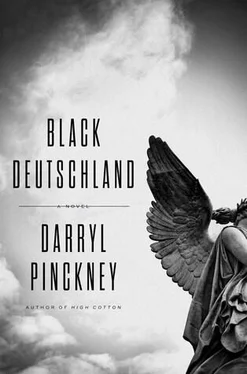In the meantime, a bomb went off in a disco over in Schöneberg frequented by American soldiers, especially black guys. Hundreds of people were injured, among them scores of American personnel. Mom and Dad phoned to make sure I’d not gone disco dancing at a straight club that night. A sergeant and a Turkish girl were killed. Real life.
* * *
I was too happy for any of it to have been real. To my astonishment, when I contacted the black noncom officers from the AA meeting near the American base in Dahlem, they agreed to get Rosen-Montag’s name onto the VIP list, which hadn’t existed before I called, for a memorial that their group of black servicemen had arranged on its own. It happened to fall on the day an infantryman in a coma was to receive the Purple Heart. There were prayers in an auditorium provided by the Free University and a Gospel duet that didn’t need amplification.
The United States had bombed Tripoli and the press that showed up wanted to make something of the black support for taking the fight to terrorist regimes. Cello showed up, too, in a wide-brimmed black hat over one of her moire nightgowns about to fall from her candy-smooth shoulders under a gleaming Mata Hari jacket. She said many people they knew had come down to Dahlem for the memorial. People who would not have gone to an event associated with the U.S. Army, never mind in support of U.S. policy, felt that they could come in honor of the victims of the bombing, because this memorial was known to be black-organized. Odell once told me that a president of the German Federal Republic went to Africa in the early sixties and began his speech, “Ladies and Gentlemen, dear Negroes…”
The servicemen’s wives cut looks at Rosen-Montag’s wife and assistants, all in black. Photographers had noticed them as well and were whirring away. It looked like a fashion shoot trying to be provocative, sleek dominatrix boots and U.S. servicemen in uniform. Rosen-Montag asked which of them had friends who’d been hurt and took up his position behind them, his wife by his side. Rosen-Montag didn’t move in his seat the whole time. He paid strict attention to the proceedings. He knew how to be a white guy deferring to black authority, he who believed the poor as well as the rich should have beauty and high design in the home. It was an angry crowd, but not everyone hated the same thing or the same people while the duet sang of sacrifice.
In Berlin, I only saw U.S. soldiers at AA meetings or on the street when they were out of uniform, but you could spot them. I’d never been to the American PX. Détente prevailed, and the U.S. presence was supposed to be low-key. Maybe that was about to change again, to go back to when prayers were said in the hope that the United States have power in a city people claimed Hitler never trusted. I liked the suburban grammar-school-looking America House, Amerika Haus, a sort of club, help desk, and library with a lecture program, not far from the newspaper stands around the Zoo Station. I once went in just to sit, but I left when I saw Cello already doing that in the lobby, dozing down the pages of Time magazine, her canvas grocery bags helter-skelter around her.
It fell to me after the memorial to introduce black to white, American to German, Cello to Rosen-Montag’s wife. When Rosen-Montag talked to you, even to men, he concentrated fiercely, totally, on you. He was so into what you were saying, increasing so dramatically in size as he revved up to answer you, that when he focused his attention on someone or something else, your world was cast back into darkness. He turned to his wife and suddenly Cello was the most noticeable figure in the crowd. Two photographers took aim at her from the steps below.
A number of people from the Lessing workshop waited on the sidewalk. They’d been unable to get in. The afternoon was brilliant. Spring had come while we mourned, a typical Berlin incongruity. Black guys gathered around me as the brother who could put them in with these females. The press girl was in no time smoking with the black soldiers. I heard Rosen-Montag say that the charred Roxy Palace in Schöneberg where La Belle Disco had been looked like his childhood. He was from Hamburg. Cello said it also looked like hers and she was from Chicago.
* * *
We were behind her grandparents’ six-bedroom house on South Parkway. Her grandmother did her best to keep us from coming over, and to keep us out of the house when we did. It was old and dark with wood passages I longed to explore. I hated her grandmother for not letting us look around ever.
Cello, Ruthanne, was then twelve years old and I was seven. A ten-year-old boy she liked had me pinned against a bush.
“Taste it.”
“No.” I pushed away the stick on which was speared a little clump of something with grass mixed in.
“Go on, you know you want to.”
Cello held her dockyard-rope braids and my older brother and her little brother and sister watched, transfixed. Dogs in the alley and cars at the corner sounded very close.
The cute boy whacked the clump up against my chin. It felt sticky.
“What is it?”
“Chicken doo.”
Everyone ran, but I couldn’t.
* * *
“Your cousin is talented? What an extraordinary family you must come from,” Rosen-Montag said on the banks of the Spree, the sun pouring over his hair and shoulders. He liked what I’d said about Frank Lloyd Wright’s Robie House. He spoke only English to me and therefore so did the rest of the workshop. Now that he’d been seen talking to me, and I’d followed him with his assistants in a second car to construction sites, people who’d previously not bothered to talk to me talked to me.
Something was up. Even I could feel it. His siege was about to be radically modified, if not lifted. Rosen-Montag was seldom in his hut. He had more meetings with officials in government offices and more meetings in other countries with art commissioners. The fax machines chanted less often, the press girl made more phone calls than she received. There were fewer people around. Berlin had gone to his openings and groundbreaking ceremonies, had taken notes at his news conferences and lectures, but I heard remarks in the canteen, in English, pointedly, that now Berlin was laughing because the governing mayor had declined to attend a screening of a documentary about Rosen-Montag at an ultrahip cinema in Schöneberg. He’d had enough. Not even the architect’s name was really his name, it was a feeble joke, an alternative paper said up front.
Rosen-Montag’s wife gave her time to what was going on at the railroad garage and the dairy. Machinery worked away in the dirt between them. Anyone who was anyone had his or her own hard hat and passes to get by security on Lessingstrasse at the river site. Rosen-Montag’s wife made a big deal at morning meetings of whom she was sending to do what at Lessingsdorf. Those in his entourage who previously had paraded around as though they were indispensable looked nervous in the canteen hut. Some smoked behind Rosen-Montag’s hut, because they didn’t want anyone to see that Rosen-Montag’s wife hadn’t taken them along to key meetings with structural engineers.
Rosen-Montag wanted to return to small Berlin — chamber structures, as he called them. He wanted people to stay home and watch public events on monitors. Television created community. Human beings wanted to live in cities, but city spaces did not have to be Roman. Population did not have to aggregate. Life without a Crystal Palace or a Coliseum need not be a hardship, he said. He opposed the giganticism of what he called classical Modernism. He wanted to move from the beehive or anthill model of human dwelling to what he called the pod, or leaf and branch model. He was the enemy of population density.
Читать дальше












